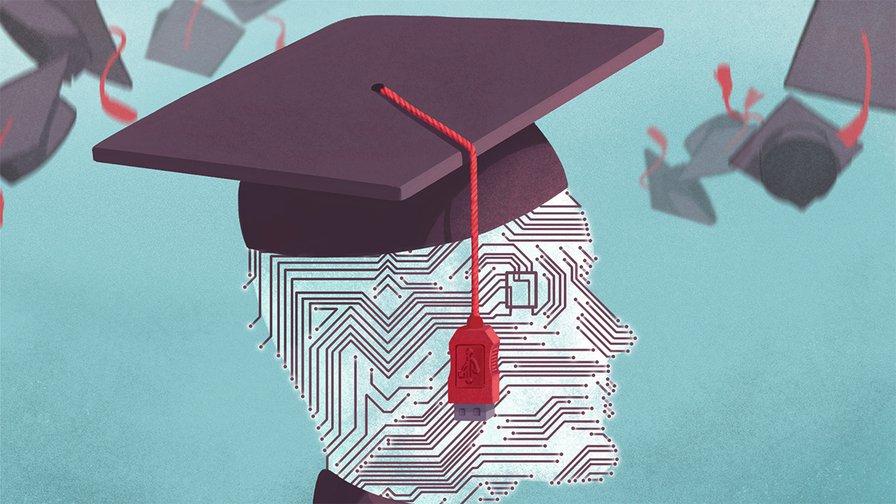How to Use AI to Build Your Company’s Collective Intelligence

my notes ( ? )
"AI can not only improve short-term productivity of organizations but can also ... increase the organization’s collective intelligence."
HBR starts well by pointing out the false dichotomy between thinking "about AI in terms of automation vs. augmentation... Augmentation doesn’t avoid automation, it simply hides it, usually in some lower-level". Example: using AI "to augment the task of writing product descriptions ... [actually] automating the task of writing first drafts... replaces human intuition, expertise, experience, and reasoning ... downsides of automation ... simply pushed down to a lower level."
Instead, we should use AI to "increase the collective intelligence of the entire organization", something that "emerges from three interdependent ingredients: collective memory, collective attention, and collective reasoning". Focusing AI on these 3 elements "can elevate the organization’s collective cognitive abilities and drive more informed decision-making in ways that are human centered and amplify human creativity."
The article then looks at how AI can support these three elements in turn:
Collective memory
"how groups allocate, retrieve, and update collective knowledge... [different staff] specialize and remember different and complementary details, so that collectively the group can recall and use more available knowledge than they could individually". This requires an understanding of “who knows what”".
Essentially this is AI-supported KM - replacing a traditional intranet and internal collaboration platform (full of "who knows what about X?" questions) with an LLM fed on "internal documents, code... emails and instant messaging".
But it can also guide where information and tasks go, helping junior staff "develop specialized skills and expertise by repeatedly allocating tasks that require specific expertise to the same individual, while simultaneously giving them the ability to retrieve relevant knowledge to complete those tasks".
Collective attention
"how groups allocate and align their focus on key tasks and priorities... AI can help guide ... attention by streamlining communication, optimizing schedules, workflows, and to-do lists", freeing human time for creative work while developing each person's "awareness of each other’s workload and availability" - essentially replacing managers and coordinators.
Collective reasoning
"a group’s ability to reason about each other’s individual and collective goals to align on collective goals and priorities... AI can help ... align members around shared goals and priorities by providing summarization and analysis of individual viewpoints... [and] making the underlying reasoning behind goals and priorities more accessible". Overall this section is the vaguest and has the most handwaving.
Strategic considerations
Integrating AI into production carries risks like "deskilling... rigid structures... homogenized solutions", managers should instead:
- coach and coordination: don't automate writing, automate critiques and feedback: improve KM
- "supercharge experimentation and expand intellectual spaces... suggesting new and different ideas that may otherwise have been left unexplored". OK, but one suggestion is to "create multiple first drafts from which the best one is selected for further development", which probably won't work (blurry jpeg argument).
Risks
Having an AI influence priorities, above, was a red flag for me, so good to see the author admitting risks: "AI can significantly affect what teams pay attention to ... joined by an AI voice assistant, they started to align their attention [to the assistant's] ... even adopted the [assistant's] specific terminology ... which further shaped where groups directed their attention". But this is what the author was earlier advocating for - strange to see a solution recast as a problem!
Interestingly, the "teams also adopted the language used by the AI in areas that were unrelated", even when they knew the AI's input was unhelpful and didn't trust it.
Similarly, while the use of AI is supposed to "supercharge experimentation" (above): "it also caused a decrease in intellectual diversity of the population overall. Through a form of algorithmic monoculture, receiving feedback from the same, centralized AI system, individuals tended to specialize in similar ways".
Read the Full Post
The above notes were curated from the full post hbr.org/2024/10/how-to-use-ai-to-build-your-companys-collective-intelligence?utm_source=pocket_shared.Related reading
More Stuff I Like
More Stuff tagged psychology , creativity , collective intelligence , strategy , hbr , ai , management , centaur
See also: Communication Strategy , Digital Transformation , Change & Project Management , Personal Productivity , Innovation Strategy , Psychology , Communications Strategy , Science&Technology , Business